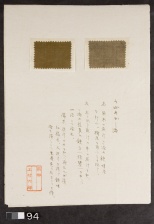Difference between revisions of "Shibaki (Ubame oak) - left (94 L)"
Jump to navigation
Jump to search
(username removed) |
(username removed) |
||
| Line 5: | Line 5: | ||
| 94 | | 94 | ||
|- | |- | ||
| − | ! scope="row"| | + | ! scope="row"|Uemura number / title |
| − | | | + | | ; "Haze-some 25" |
|- | |- | ||
! scope="row"|Folder location | ! scope="row"|Folder location | ||
| Line 41: | Line 41: | ||
| ash water | | ash water | ||
|- | |- | ||
| − | ! scope="row"| | + | ! scope="row"|Uemura's notes |
| The sample was firstly soaked in a bath containing dye extract and ash water. Subsequently, the iron mordant was added to the dye bath. If ash water alone was used in the dyeing process, the resultant color would be pale red beige. If smaller quantity of ash water and larger quantity of iron mordant would be used, the resultant color would become dark brown. | | The sample was firstly soaked in a bath containing dye extract and ash water. Subsequently, the iron mordant was added to the dye bath. If ash water alone was used in the dyeing process, the resultant color would be pale red beige. If smaller quantity of ash water and larger quantity of iron mordant would be used, the resultant color would become dark brown. | ||
|- | |- | ||
| − | ! scope="row"| | + | ! scope="row"|Uemura's date |
| Kyoto | | Kyoto | ||
|} | |} | ||
| − | [[Category: | + | [[Category:Uemura dye archive]] |
Revision as of 06:17, 24 July 2013
| Museum number | 94 |
|---|---|
| Uemura number / title | ; "Haze-some 25" |
| Folder location | 2nd shelf |
| Sample location | left (94 L) |
| Fiber type | silk |
| Color | brown |
| Dyestuff (Japanese common name) | 柴木 : Shibaki |
| Dyestuff (botanical name) | Quercus phillyreoides A.Gray |
| Plant part | heartwood/dried (?) |
| Dyestuff extraction | boiled in water |
| Auxiliary agent in dye bath | - |
| Mordant | melanterite |
| Other auxiliary agent | ash water |
| Uemura's notes | The sample was firstly soaked in a bath containing dye extract and ash water. Subsequently, the iron mordant was added to the dye bath. If ash water alone was used in the dyeing process, the resultant color would be pale red beige. If smaller quantity of ash water and larger quantity of iron mordant would be used, the resultant color would become dark brown. |
| Uemura's date | Kyoto |
